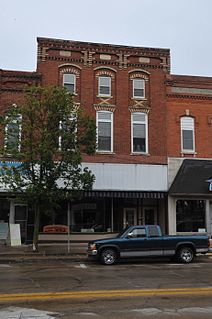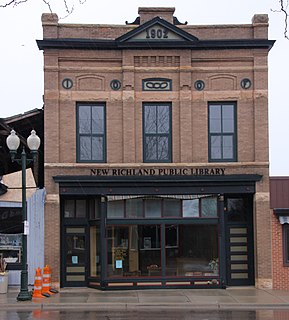
Odd Fellows, or Oddfellows, also Odd Fellowship or Oddfellowship, is an international fraternity consisting of lodges first documented in 1730 in London. The first known lodge was called Loyal Aristarcus Lodge No. 9, suggesting there were earlier ones in the 18th century. Notwithstanding, convivial meetings were held "in much revelry and, often as not, the calling of the Watch to restore order." Names of several British pubs today suggest past Odd Fellows affiliations. In the mid-18th century, following the Jacobite risings, the fraternity split into the rivaling Order of Patriotic Oddfellows in southern England, favouring William III of England, and the Ancient Order of Oddfellows in northern England and Scotland, favouring the House of Stuart.

Thomas Wildey (1782–1861) was the founder of the Independent Order of Odd Fellows (IOOF) in North America.
Odd Fellows Hall, Independent Order of Odd Fellows Building, IOOF Building, Odd Fellows Lodge and variations are buildings for a chapter of the Independent Order of Odd Fellows fraternal organization.

IOOF Building is at 208 North Fifth Street in Kingman, Arizona. The two-story building was built in 1912. The building was in the Mission/Spanish Revival style. This was the second fraternal organization clubhouse in Kingman. In 1922, the first fire station in Kingman was built next door. IOOF is the Independent Order of Odd Fellows. Today, IOOF no longer uses the building, and it serves as a fitness facility called SHIFT Training Center. This building is on the National Register of Historic Places and the number is 86001150.
IOOF Building may refer to two buildings in the centre of the city of Adelaide, South Australia. The first was built in the late 19th century and was demolished in the early-mid 1960s. As a result of this, the second was built as a "replacement" in the mid 1960s.
Odd Fellows or Oddfellows is an international fraternity and its members.

The IOOF Hall in Toronto is a historic building erected for the Independent Order of Odd Fellows society. The building was designed for mix-use accommodating over 34 offices, a store selling imported and domestic cigars, and most importantly a 20’ wide by 46’ long grand hall for private meetings held by Toronto’s Independent Order of Odd Fellows. It was the first society hall in Toronto to be built with an electrically run elevator running up from the ground floor to the 3rd floor society rooms.

The Wyandotte Odd Fellows Temple is a community building located at 81 Chestnut Street in Wyandotte, Michigan. It was listed on the National Register of Historic Places in 2009. As of 2010, the building serves as the Wyandotte Arts Center.

The Arroyo Grande IOOF Hall is a building in Arroyo Grande, California, that was built in 1902. The building housed the town's chapter of the Independent Order of Odd Fellows, which was established in 1887. The order planned a two-story building with a storefront on the first floor; the building is one of the tallest in downtown Arroyo Grande. The sandstone building was designed in the Romanesque style and features segmentally arched windows and doors and a crenellated parapet with a large merlon in the center. In 1985, the Odd Fellows lodge disbanded, and the building is now owned by the South County Historical Society. It was listed on the National Register of Historic Places in 1991.

The Fullerton Odd Fellows Temple, also known as IOOF Building or Independent Order of Odd Fellows Lodge No.103 or Williams Building, is located in Fullerton, Orange County, California. It was built during 1927-28 for the Independent Order of Odd Fellows Lodge Number 103, which existed from 1901 to 1981.

The IOOF Building is a historic building located in Maquoketa, Iowa, United States. Built in 1886, it is a three-story, Late Victorian, brick structure. It is one of several buildings in the central business district that utilizes brick as the primary decorative material. What makes this one unusual is the decorative use of light cream colored brick around the windows, between the second and third floors, and in the cornice. The basement of the building has been used for a barber shop, the main level has housed various retail businesses, and the upper floors are used by the Independent Order of Odd Fellows for their clubhouse. The building was listed on the National Register of Historic Places in 1991.

The New Richland Odd Fellows Hall is a historic Independent Order of Odd Fellows (IOOF) clubhouse in New Richland, Minnesota, United States, built in 1902. It was listed on the National Register of Historic Places in 2006 under the name Strangers Refuge Lodge Number 74, IOOF for its local significance in the themes of entertainment/recreation and social history. It was nominated for being the home of a large and important local fraternal organization, and for serving as a venue for a wide range of other groups and events. The building now houses the New Richland Public Library.

The Odd Fellows Building in Raleigh, North Carolina, also known as the Commerce Building, is a 10-story skyscraper built in 1923. It reflects Late 19th and Early 20th Century American Movements architecture and Classical Revival architecture and consists of the classic base-shaft-capital design. The Odd Fellows (IOOF) Building served as a meeting hall for the Independent Order of Odd Fellows and as a business.

The Independent Order of Odd Fellows in Sweden (IOOF), is a part as a grand lodge of the non-political and non-sectarian Independent Order of Odd Fellows, made up of people of good character who have a desire to promote universal harmony and are ready to exercise works of charity and benevolence, specially to those in need.

The former I.O.O.F. Hall, located at 613-615 Iowa Avenue in the original commercial block of Dunlap, Harrison County, Iowa, is an historic two-story pedimented red-brick building built for local members of the Independent Order of Odd Fellows. Also known as the Odd Fellows Hall, it was used by Golden Rule Lodge No. 178, IOOF founded in 1869 and Guiding Star Encampment No. 68, IOOF, a higher body founded in 1874. Like many American lodge halls of the late 19th and early 20th centuries, it had business and commercial space on the ground floor while the lodge hall was upstairs. In 2009 it was renovated for its owner Brad Gross, CPA, who now uses it for his professional office. On June 23, 2011, it was added to the National Register of Historic Places.
The Grand United Order of Odd Fellows, American Jurisdiction is a jurisdiction of the Grand United Order of Oddfellows in the United States Jamaica Canada South America etc. Since its founding in 1843 its membership has principally included African Americans, due to Black people being discriminated against, as was the norm in Fraternal Orders in America during the 17-1800s.













